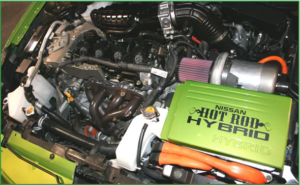Why would I want to recondition my hybrid battery pack?
 For most car owners, replacing a battery isn’t really a big deal. It’s not something that drivers have to do very often, but when they do, it’s a simple task that won’t put a dent in the wallet. Discount car batteries can cost as low as $30, while more expensive, premium brands can cost between $80 and $120. Although it’s smart to properly maintain your battery, there are certainly bigger things to worry about in a car, like the transmission, which can cost upwards of Rs450000/= to replace.
For most car owners, replacing a battery isn’t really a big deal. It’s not something that drivers have to do very often, but when they do, it’s a simple task that won’t put a dent in the wallet. Discount car batteries can cost as low as $30, while more expensive, premium brands can cost between $80 and $120. Although it’s smart to properly maintain your battery, there are certainly bigger things to worry about in a car, like the transmission, which can cost upwards of Rs450000/= to replace.
For a hybrid car owner, on the other hand, the battery is an integral (and complex) part of the vehicle’s operation, equally as important (and expensive) as the transmission. In fact, it’s not just one battery but an entire pack of battery modules. The battery pack in most hybrid cars provides at least some of the power needed to propel the vehicle forward — it gives its power to the electric motor at lower speeds. Without the battery pack, drivers wouldn’t be able to get the kind of fuel efficiency and low emissions hybrid cars aim for in the first place.
But uncertainty has dogged hybrid vehicles for a while now, and claims that hybrid battery packs are unreliable are some of the most common concerns. Currently, nickel-metal hydride (NiMH) batteries are an expensive part of a hybrid car’s makeup and cost about Rs600000/= to replace. But past rumors about faulty batteries in hybrid cars have turned out to be largely false. Most hybrid car manufacturers guarantee their batteries for the life of the car, which is typically between 80,000 to 100,000 miles (128,748 to 160,934 kilometers) or 10 years, sometimes even longer. That means if anything actually does happens to the battery within the warranty period, the company will replace the battery for no extra charge.
If a hybrid car experiences a battery failure outside of that guarantee, however, the owner is on his or her own when it comes to battery replacement. But that replacement may not be necessary in every case. Toyota has developed a way to extend the life of the Prius battery beyond the company’s guarantee by reconditioning.
In the rare case that a driver encounters a problem with the battery pack before the hybrid reaches 10 years or 100,000 miles (160,934 kilometers), Toyota will replace the pack with a brand-new one. Instead of scrapping the old pack, however, they hang on to it. This is because battery packs built for the Prius consist of 28 separate modules, and any problem in a battery pack is most likely due to one of those modules, not all of them.
Toyota also has a main recycling center that collects battery packs from scrap yards. In fact, there’s a toll-free number on every Prius battery that informs callers that a $150 reward awaits them if they bring the pack to any Toyota or Lexus dealer. Instead of letting batteries degrade in a landfill, Toyota pays scavengers to reclaim them.
So, although Toyota can’t replace the battery pack when the warranty has run out on a Prius, it can recommend reconditioning the battery pack as a cheaper alternative to outright replacement. If anything goes wrong in a unit after 100,000 miles (160,934 kilometers), Toyota can locate which one of the 28 modules is causing problems and replace that individual module. By harvesting from the older, recycled battery packs they’ve collected, technicians can find a matching module that has a similar chemistry and age as the other 27 modules and recondition the battery by replacing only the faulty module.
Reconditioning the battery in a Toyota Prius not only extends the life of the battery by adding another six years; it also reduces maintenance costs for the owner. At Rs400000/ battery reconditioning costs about one-fourth the price of replacing the battery pack entirely.
We are doing the same reconditioning process to your battery.
